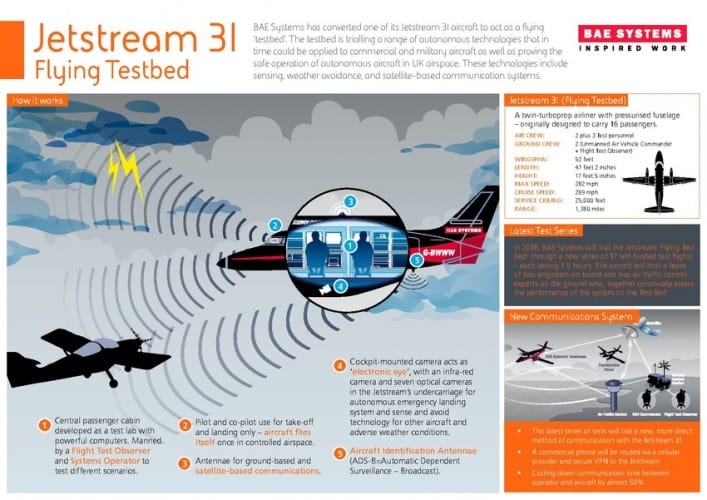BAE Systems kicks off next stage of unmanned air trials
A Jetstream 31 aircraft is being used as a flying testbed for the next phase of BAE Systems’ unmanned aircraft trials.
Over the course of 17 test flights from Warton, Lancashire, to Inverness, the company will test the capability of its autonomous technologies to control the Jetstream via satellite link. Two pilots will be on board to operate the plane for take off and landing, along with two engineers to assess the performance of the unmanned systems. Support on the ground will come from a flight test observer and an unmanned air vehicle commander, as well as air navigation service provider NATS.
The Jetstream is fitted with an antenna that detects transponder signals from other aircraft. A cockpit-mounted camera links to the onboard computer systems and enables the aircraft to ‘see’ potential hazards even in the absence of signals. It can also recognise different cloud types and, when required, adjust course to avoid adverse weather.
“Our priority as always is to demonstrate the safe and effective operation of autonomous systems and together with NATS we are working towards the possibility of flying our own unmanned systems in a highly controlled environment in the UK,” said Maureen McCue, head of Research and Technology for BAE Systems’ military aircraft and information business.
Register now to continue reading
Thanks for visiting The Engineer. You’ve now reached your monthly limit of news stories. Register for free to unlock unlimited access to all of our news coverage, as well as premium content including opinion, in-depth features and special reports.
Benefits of registering
-
In-depth insights and coverage of key emerging trends
-
Unrestricted access to special reports throughout the year
-
Daily technology news delivered straight to your inbox











Water Sector Talent Exodus Could Cripple The Sector
Maybe if things are essential for the running of a country and we want to pay a fair price we should be running these utilities on a not for profit...